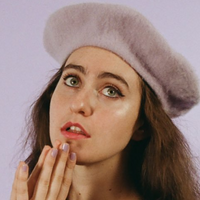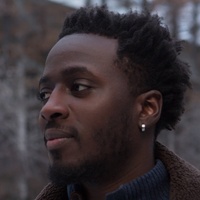As told to Michelle Lyn King, 2174 words.
Tags: Comedy, Poetry, Writing, Mental health, Multi-tasking.
On trying to detach from external validation
Comedian Cat Cohen discusses re-imagining success, writing her first book, gratitude lists, and the benefit of unplugging from social media.Your book [God I Feel Modern Tonight] does such a good job of capturing the fact that most of life’s saddest moments often butt up against absurdity. I’d like to hear what you were trying to do with this book. What experience did you want the readers to have?
The book came together naturally because I’d been writing these little poems since 2015. I wanted this book to be a place where I could express some more serious things and write things that weren’t just jokes. I’d read my poems on stage sometimes, but at a certain point I started writing more serious poems in private, and I was like, “I can’t read these onstage.” They wouldn’t fit into my act, but I want to share them. The book gave me space to experiment more. I wanted it to be treated like serious poetry, not jokes or whatever. There’s something so cringy to me about, “Comedian wrote a poetry book!” I wanted it to be funny and heartbreaking and all the things that I like.
I’ve heard you say in other interviews that if the idea of everybody liking your work horrifies you and that makes sense to me. If everyone likes your work, you’re probably making something really hygienic and safe. At the same time, I’m somebody who cares about external validation, even if I would wish I didn’t. Do you struggle with that? How do you find that balance between wanting to create the art you want to and knowing that not everyone’s going to like it, but also wanting some people to like it?
It’s so tough. I’ve spent the last year famously trying to detach from external validation, which is obviously not going well. When I first started making stuff, I was just like, “I want everyone to like this,” and I never saw it as a good thing that not everyone liked something. Now I’m trying to be like, “Okay, that just means you’re doing something very specific with a clear point of view that obviously not everyone can relate to.” It’s the same way if someone can make fun of your voice or parody it. It just means it’s strong enough to be digested in that way. I just try and make stuff that I can stand behind and not worry beyond that. The only thing that would be embarrassing is when I share something that I don’t really like. Even some of the older poems in the book I’m like, “I don’t really think this was that great.” But as a whole, I can stand behind it. And I thought it was important to include some of the earlier ones to show a bit of a journey, if you will. But obviously I want everyone to like me. It’s really hard when they don’t.
When you’re actively trying not to focus on external validation, how do you know what feedback to listen to?
I think it depends on the form. When it comes to stuff I would do on stage, like jokes or songs—live stuff—I feel like I have so much experience that I can really listen to myself and be like, “I know this is going to land.” But if I’m working on a script or just something I haven’t done a lot of and my manager has a note, I’m like, “Oh, I really take that into consideration.” I almost always listen to her because she’s read a bunch more scripts than I have. She’s been through this process before, whereas this is so new to me. So it just depends on what medium I’m working in. With the poems I feel like it’s such a internal rhythm thing that I know when it’s hitting right and I can just listen to that. My editor gave really thoughtful notes as I was working on the book. And similarly, because I’d never written a poetry book before and she’s done a ton, I took almost all of her notes. I was like, “This woman has such great taste and she’s so smart and she’s a poet herself,” and I just really trusted her and valued her opinion.
Have you ever had an experience where you took a note and you looked back and you were like, “Oh, I shouldn’t have taken that. I should’ve gone with my gut and gone with my instinct”?
Probably, but I think that’s how you figure out to trust it. If you feel that way, though, it was probably because there’s something else missing that you haven’t yet figured out. I remember years ago wanting to be in this showcase or something and I was like, “If I changed this one bit of this one character I would’ve gotten in.” But, no, that just wasn’t the right thing for me.
What role do you see vulnerability having in your work?
It’s everything. I feel like I have all these feelings and I need a place to put them. So I’m like, “I’m just going to throw it out there. And if someone connects with it, that’s great.” And, yeah, when people feel they know me or whatever, I love it. I’m like, “I feel like I know you.” If you’re vibing with my work, then I know we probably have a lot of similarities and a similar worldview to a certain extent.
I want to return to something you said earlier, that you’re actively trying to detach from external validation. I’m interested in how you do that.
It’s impossible. But I think the main thing is that my relationship with social media has really changed. I post. I try and put stuff out there often, but I try really not to look at anyone else’s shit and I try not to even be obsessed over the comments or the likes. I’m just like, “Don’t look. Just keep making.” You have to be like that. Just keep making stuff and don’t worry about the response. Just keep making stuff that you’re excited about. But, yeah, it is tricky. I have fantasies of completely logging off and living on a farm or some shit and just being like, “Fuck you.” But that wouldn’t make me happy because I need the community that sharing work provides. I feel like I’ve met so many amazing people from sharing my work and reading theirs. Now I’m thinking that even though I say I don’t like to look at stuff on social, it is fun to discover other writers or artists who you like, and I’ve made so many amazing friends through Instagram. I think it’s just about putting it away when you’re feeling really crazy and coming back to it when you’re in a more solid, grounded place.
It’s a very difficult task, to think of how can you create art that you’re proud to stand behind and that you want people to see, but also that ultimately someone could criticize and you don’t give a fuck.
Totally. It seems silly to be like, “I want retweets or likes or followers,” but I want a platform and I want to be able to actually have the things I’m making be seen and heard. I just try and come back to reality whenever I feel overwhelmed, like calling a friend or just writing something and not immediately posting it, just getting it out.
It’s easy to say, “Why would you care about Twitter likes?” But those likes represent people who’ve responded to what you’ve written, even if it’s just a short joke or observation.
And also people get work and jobs and opportunities from [social media]. I don’t really see it as an option to be completely offline. The goal for me is to be so successful and famous that I don’t have to be online.
What do success and failure look like for you in terms of creative work?
My definition of success and failure changes every year because it’s never enough, what I want. I always want more and more and more. So it just shifts and changes. There are some people [who I look at and think], “You’re so successful,” but they’re unhappy. It’s very difficult. I don’t know. I just think success is….it’s the craziest word. Success almost feels you’re dead. It’s done. I want to always be striving for something. It’s so funny. I remember after I did Seth Meyers and it aired, I was so excited and my dad was so excited and we were on the phone talking. And while I was walking around talking to him we both felt like everyone on the street should be coming up to us like, “Oh my God! Seth Meyers!” And no one gave a shit. But that was one of the most joyful things ever, to be able to share that with [my dad]. It was the best.
When self-doubt does strike, do you have anything that you do to move through it? Or is it just letting the wave pass?
As Rilke once said, “No feeling is final.” So I’m just like, “It’ll pass.” But I think the things that help me are hot baths, long jogs, cooking, anything that’s physical and just makes me feel present. And sometimes I ask my boyfriend, I’m like, “Will you fuck this horrible feeling out of me?” Sometimes it works and sometimes I just get more sad. It’s tricky. But I think anything that makes me feel in my body is helpful.
On [your podcast] Seek Treatment, you and [your co-host] Pat [Regan] both talk very openly about being in therapy. I’m interested in the role that you think caring for your mental health has in being an artist.
I think everyone should be in therapy. A lot of times I joke that it doesn’t even work. But I like knowing that I’m at least doing what I can to take care of myself. When I’m depressed or anxious, I can’t work. It’s not fun. It’s not possible. There’s a difference between being like, “Oh, I’m an artist. I’m unstable. I’m crazy.” And being like, “Oh, I’m an artist. I’m feeling very intensely.” Therapy puts you more in tune with what is actually going on inside you. For me, the ups and downs of my moods were just unbearable and being a little more in the middle has helped me process things and turn them into art.
On the topic of Seek Treatment, I want to talk to you about collaboration. How has collaboration helped your art?
I feel it’s given me everything. The people I’ve worked with, Pat, obviously, has made me so much funnier. The first big show I hosted in New York was with Mitra Jouhari and Patti Harrison and they helped me find my voice. They made me so funny and feel so confident in putting myself out there. Writing songs with Henry Koperski has given me everything. I wouldn’t be where I am without those relationships. So I think it’s really important. But at the same time, it’s also important to me that both individuals have other projects and things they’re working on because I never want to feel… I don’t think it’s ever good to feel too reliant, like you can’t do something without someone. That’s not a good feeling. But it’s nice to feel inspired by people and lifted up by them.
Are you a person who experiences jealousy? Not even necessarily of your friends, but about other people in the community?
Yes. Literally constantly. I have a perfect life and I love myself and I’m always jealous of everything at all times. I’m so jealous. It’s crazy. It doesn’t even make sense. Things I don’t even want I get jealous of. You just have to be like, “Look at all the amazing things I have.” Gratitude list vibes. Everyone has their struggles and the shit they’re going through. One time someone said they were jealous of me and I thought it was crazy. I was like, “What are you talking about? You don’t know how miserable I feel.” But, no, at the end of the day, I wouldn’t change a thing.
Cat Cohen recommends:
five things to help you zoom out for once
take a hot bath - so hot it hurts & you have to wait naked near the tub shivering with anticipation til it becomes cool enough to submerge ur bod
run til you’re tired (could mean 60 seconds or 6 miles) – I run to this when I feel like shit & this when I feel like life is possible
read this poem out loud to yourself
crum (make yourself cum & have a nice cry after)
stand up & drink a full glass of ice water, look out the window, shiver & pretend you’re in a play




